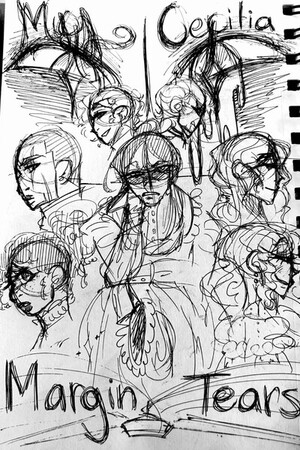Chapter 17:
My Dearest
Margin Tears: My Cecilia
The warm grey of dawn crept into the servants’ quarters, brushing the edges of the beds with pale light. For once, Cecilia’s eyes blinked open before the call of the bell. She lay there for a moment, surprised at herself, listening to the stillness. There were no voices, no shuffling of sheets—Nothing yet. The house still seemed to be asleep.
Strange.
She turned her head to Coriander’s bed beside hers. Coriander herself still seemed to be fast asleep, the morning’s light not causing a single stir. It felt a little surreal—a strange thing to think after experiencing the surreal already—but seeing Coriander still resting, the blanket pulled up to her shoulders, hair haloed around her as her face pressed into the pillow, was sweet.
Cecilia smiled faintly as she stepped out of bed, careful not to be too loud as she rummaged about her small space. Getting dressed layer by layer, straightening her apron, pinning her collar without stabbing herself in the neck, tying up her hair, making her bed—Somehow, she managed to accomplish her little morning chores, shifting and shuffling all the way, without startling Coriander awake. It made her raise an eyebrow as she approached the other’s occupied bed.
Cecilia hated to wake her when she was resting so soundly, probably exhausted from the ball’s preparations, but she also did not want her facing any stress for sleeping in. So, standing over the Coriander-shaped lump under the blanket, she leaned on one hand to crouch low enough to be heard. “Coriander,” she whispered, voice hushed and fond. “It’s time to get up, girlie. It’s been so quiet, the kitchen may actually be unguarded right now.”
No reply.
Her brow furrowed as an unsettled concern twisted in the pit of her stomach. “Coriander,” she urged again, her voice growing an edge as she reached out to shake her shoulder.
Her fingers stilled the moment they touched.
Coriander’s skin was cold.
Cecilia froze, breath caught in her throat as she heard her blood rush to her head, felt it burn her body from underneath the skin. Her hands started to tremble, and Cecilia clenched her fingers around Coriander’s blanket, ripping it off of her. She prayed for any hint of movement, any sign of breath, any hope of life.
Coriander’s nightgown laid white and stagnant against a creased bedsheet. Her chest did not rise or fall. There was not so much as a twitch from the sudden movement or rush of cool air.
She was so cold, smooth, and still.
Cecilia grasped Coriander’s shoulders, throwing her onto her back, eyes wide and panicking strained to catch any sign of anything on her face.
But there was none.
There was no face at all.
Smooth skin. No round nose. No full lips. No wide eyes. No dip or curve or freckle.
It was just blank.
The room tilted around Cecilia. She pulled her hand back like she was bitten, heart slamming against her ribs.
“No,” she whispered, shaking her head, throat tightening. Her knees gave out as the room kept spinning and spinning and spinning, her legs sprawled out in front of her as she crawled backward to the door. She was going to be sick, going to scream and cry and vomit and die, but she could not stop staring at Coriander’s bed. “No, no, no—!”
It had to be a bad dream. Even in this horrid, messed up cage of a world, in all its silence and stillness in this moment, it had to be a nightmare, an overwhelmed play of her imagination—
A bird’s chirp from outside the window made her blanch.
The first footsteps echoing from the end of the corridor made her twitch.
And she screamed.
The sound that tore from her then was not a word but a raw, ragged scream—an animal cry of loss, terror, and disbelief. It ripped through the quiet as she ripped at her hair, nails clawing into her scalp and roots.
Louder than the morning bell, louder than Dmitri’s voice, louder than anything Cecilia had ever made herself.
And the footsteps followed.
…
The hall was full of voices.
Cecilia stood among them, unmoving, a still figure in the flow of bustling house staff and murmuring guests. Members of staff, two or three or some number that came in during the hecticness following her scream, had taken Coriander’s body away. The bed was swiftly stripped bare, erasing the remnants of her shape. Without her even realizing, Coriander’s few belongings of clothes and hidden cups were whisked out of sight and reach. All evidence of her existence was gone, as though erased by some cruel hand.
Cecilia’s own hands hung at her sides, limp. She heard whispered words of shock and morbid intrigue—“unexpected,” “tragic,” “mysterious.” The empty sentiments, sounding more like rumor than mourning, slid past her as she stumbled through the fray. Her gaze drifted from face to face, but they were blurs, colors and shapes that would not come together with any meaning.
She felt her own body disjointedly, as if from afar. Her feet may have been anchored to the ground, but her mind floated somewhere just above, dislodged from herself. A hollow space had opened inside her, where warmth and laughter and hope had lived only hours ago.
A voice brushed her ear—someone asking if she was all right—but she did not answer. Her tongue felt heavy, her throat dry. There were no words to say, none worth opening her mouth and wasting the breath to speak. The only words she could form were silent, echoing in the cavern of her skull.
She was here. She was alive. She was real. And now she’s gone.
The house moved on, indifferent, the wheels of duty grinding forward. The guests would dine. The floors would be polished. Life would press on as though nothing had been broken, like the hollow space could be so simply refilled.
…
The day blurred past, slow and fast and static all at once.
Cecilia drifted like smoke through the halls, her steps carrying her forward without thought, her hands idle at her sides. The servants moved around her in swift lines, trays carried, linens folded, voices hushed to the proper pitch of duty.
She perceived their shapes but did not see them; she heard their words but did not listen for any meaning.
What meaning was there?
The air seemed thinner than it had been before, as though Coriander had taken something essential with her when she left. When she was taken. Every surface Cecilia touched felt strange—wooden banisters, brass handles, the hems of her skirts, everything was all dulled. A monotonous touch.
She stopped at the edge of the scullery, staring blankly at a stack of silver that needed polishing. She just…looked at it. And looked at it. And looked and looked some more. The longer she stared, the less real it became. Perhaps it wasn’t. It never was.
She might have stood there forever if a sharp voice did not cut through the fog.
“Well, don’t just stand there,” another maid snapped. “Do you know how little time we have to get everything done? And we’ve more work now, with a set of hands gone.”
The world narrowed; muted. Everyone still moved; everything still made noise. But Cecilia only heard the minute shrill of her focus really focusing. Her pupils constricted as they slowly rolled from the silver to the maid off to the side, hands planted firm on her hips balancing folded cloth as she tapped her foot expectantly.
A beat passed.
A second.
And she lunged.
With a wild thing, her body clashed against the other woman’s, hissing and spitting as her fingers curled into the maid’s apron, shoving her hard against the wall. The sound of the impact made others startle, but Cecilia hardly heard it over the pounding of her heart, of her head, of whatever else she was made up of.
“Don’t you dare—,” she hissed, voice shaking, not even knowing what she was demanding. She slammed the maid’s body into the wall over and over again as she panted, more beastly than human.
The more she stared at the other’s face, the less she saw. The less it was real. The less any of it—anything at all in this wretched, damned, house—mattered.
“Don’t you—don’t you dare—!”
The girl struggled, eyes wide with alarm, but Cecilia was beyond reason. Rage, grief, and horror surged through her like floodwaters breaking through a dam, determined to take everything else along with it.
It was then that strong arms seized her from behind, prying her away. Cecilia thrashed, gasping, until a low voice steadied against her ear.
“That’s enough.”
Wild black eyes shot up to see Nero, his hands around her iron-firm but not cruel, his presence disciplined in its maneuvering. He pulled Cecilia back, placing himself between the two women as they both huffed and shook, one from fear and the other from emotions she could not begin to name.
“Look at me,” the older man said, his voice quiet but commanding. “Please, miss.”
Cecilia’s chest heaved, her throat raw. Her body stood paralyzed, adrenaline and grief tying her stiff. But he stood there with her, patience and unmoving, his hands loosened from constricting to grounding as they rested on her shoulders. Slowly, reluctantly, her gaze lifted to meet his.
His eyes were steady, worn with sorrow and understanding too raw for Cecilia to swallow, but too familiar to look away from. “I know,” he said. “I know what this loss does to you. But don’t let your grief corrupt into madness. That’s not what your friend would want for you.”
Cecilia’s body went slack, and if not for Nero’s hold on her, she may have fallen to the floor again. Tears she hadn’t even realized were building blurred her vision, raining down her cheeks and dripping to the spotless floor.
Those hands squeezed her shoulders, a rough comfort to ease the weight of their shaking. “Hold her memory close,” he rumbled. “It’s a beautiful thing, so please, keep it that way, for both her and yourself.”
Cecilia bowed her head, unable to speak, the weight of the words pressing into her chest as she clutched her throat, feeling the round body of Coriander’s pin press against the heat of her skin.
The other maid, pale and shaken, hurried off without another word. The bustle of the scullery resumed around them, as though nothing had happened.
But Cecilia stood still, clinging to the only things that tethered her—the caring touch of the veteran’s hand, the cooling metal of Coriander’s keepsake, and the faint, fleeting sense that in her grief, she was not entirely alone.




Please sign in to leave a comment.